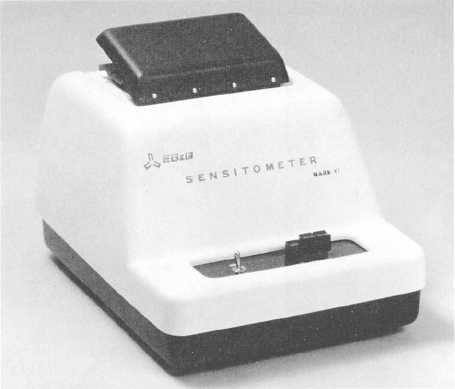Figure 10-24.–EG&G sensitometer.
Courtesy of EG&G, Inc.
302.288X
these measurements are through sensitometry and
densitometry. When sensitometry and densitometry are
used, variations from the standard and the corrections
recommended are expressed in numbers, not in terms of
personal opinion.
SENSITOMETRY
Sensitometry is the science of determining the
photographic characteristics of light-sensitive
materials. In sensitometry, special test or control strips
are prepared by accurately exposing the material with
varying amounts of light. These test strips are then
processed.
A sensitometer is an instrument used to produce the
special test strips called sensitometric strips. A
sensitometer is used to produce these sensitometric
strips because it provides consistent and repeatable
exposures of a known quantity and quality of light. The
sensitometer is used to expose a strip of film with
varying amounts of known exposure on the same strip
of film. Since the sensitometer provides repeatable
exposures each time, any changes in density indicates a
change in processing. In Navy photography, the
sensitometer is used to expose black-and-white
materials only. There are several uses for sensitometric
strips; but in this training manual, we are only concerned
with monitoring a process. Here the sensitometric strips
are used as control strips. Control strips are made and
processed under the controlled conditions of time,
temperature, and agitation. This is true for both
black-and-white and color materials. Black-and-white
control strips are usually made in the photo lab, while
color control strips are obtained by the manufacturer of
each material.
Ideally, a sensitometer should be designed so you
can accomplish the following objectives:
1. Predetermine the total amount of exposure.
2. Determine the difference in exposures given to
various areas.
3. Control the color quality of the light.
4. Consistently reproduce or duplicate the same
lighting conditions.
5. Provide a wide range of exposures.
The sensitometer used most commonly in the Navy
today is the Egerton, Germeshausen, and Grier (EG&G)
sensitometer (fig. 10-24). This sensitometer uses a
10-39


